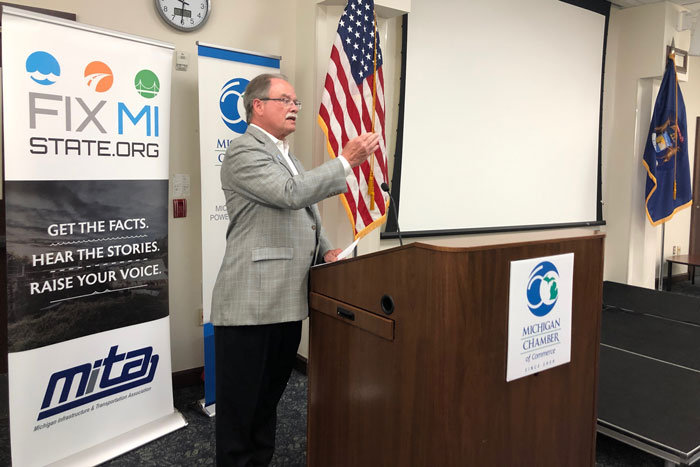Michigan’s crumbling roads won’t be fixed with “fairy dust and wishful thinking,” Michigan Chamber of Commerce President Rich Studley said Tuesday as business, local government and builder groups renewed calls for state lawmakers to work with Gov. Gretchen Whitmer on a long-term infrastructure funding solution.
“We’ll continue to challenge members of the ‘unicorn caucus’ — people who believe that there is a magic solution to this problem that no one’s ever seen — to explain how they would pay to solve this problem,” Studley said during a press conference here.
The powerful Michigan Chamber and other interest groups are ramping up road funding pressure on state lawmakers this week as they head to the annual Mackinac Policy Conference after approving a no-fault auto insurance plan brokered by Republican legislative leaders and the Democratic governor.
Conversation at the island confab is expected to return to road funding. Whitmer has proposed a 45-cent per-gallon fuel tax hike to generate $2.5 billion in new revenue that would be used to fix the roads and free up dedicated general fund dollars for other top budget priorities like K-12 schools.
Senate and House Republicans have vowed to present alternative road funding plans but have not yet done so. They gave a higher priority to auto insurance reforms that are expected to reduce rates that rank among the highest in the nation.
Republicans have so far balked at Whitmer’s proposed $2.5 billion fuel tax plan, which would nearly triple Michigan’s current 26.3-cent fuel tax and easily give the state the highest rate in the nation.
But “the governor’s solution is the only one on the table that is constitutionally dedicated, and comes from a user fee and gets to the need that we have,” said Lance Binoniemi, vice president of government affairs for the Michigan Infrastructure & Transportation Association.
While the road builders group is willing to discuss alternatives, “as we speak now, there’s nothing else on the table,” Binoniemi said.
While some penny pinching may be possible in the Michigan Department of Transportation, “there’s only so much you can do with efficiency,” Studley added.
Michigan’s bad roads got worse in 2018 and the condition of the state’s aging infrastructure is not projected to improve over the next decade despite a 2015 funding law that is still being phased in, according to an annual review by the Transportation Asset Management Council.
Among the 88,000 lane miles of paved Michigan roads that are eligible for federal aid —freeways, arterials, minor arterials and major collectors — experts rated 21 percent in “good” condition, 38 percent “fair” and 41 percent “poor.”
Road funding advocates say raising the fuel tax could help motorists save on costly vehicle repairs necessitated by damage from poor roads. They argue that spending now will help the state avoid a bigger price tag down the line because it is cheaper to maintain a decent road than replace a bad one.
“When it comes to infrastructure, when it comes to roads … Michigan communities are suffering mightily,” said Dan Gilmartin, executive director & CEO of the Michigan Municipal League.
“We cannot have great businesses in this state, we cannot have a great economy in this state, we cannot attract talented workers to the state unless we have great infrastructure, period, end of story.”
Studley said good quality roads are important to some of Michigan’s biggest industries business sectors, including the tourism industry, agriculture and manufacturing.
The chamber supports a “user fee” model like a fuel tax hike, and Studley said the remainder of 2019 should be a “window of opportunity” for lawmakers to act in a non-election year.
“There is no example in modern history of any lawmaker in the House or Senate who has voted for increased funding to fix the roads not being re-elected,” Studley said.
While Republican President Donald Trump has floated the idea of a major boost in federal infrastructure spending, he walked out of a related meeting with Democratic leaders last week amid a bitter battle over congressional inquiries into his 2016 campaign and a special counsel report on Russian election interference.
“This is a Michigan problem that needs a Michigan solution now,” Studley said. “There’s not a pot of gold at the end of the federal rainbow.”
Read more at https://www.detroitnews.com/story/news/politics/2019/05/28/michigan-chamber-wishful-thinking-roads/1257475001/

